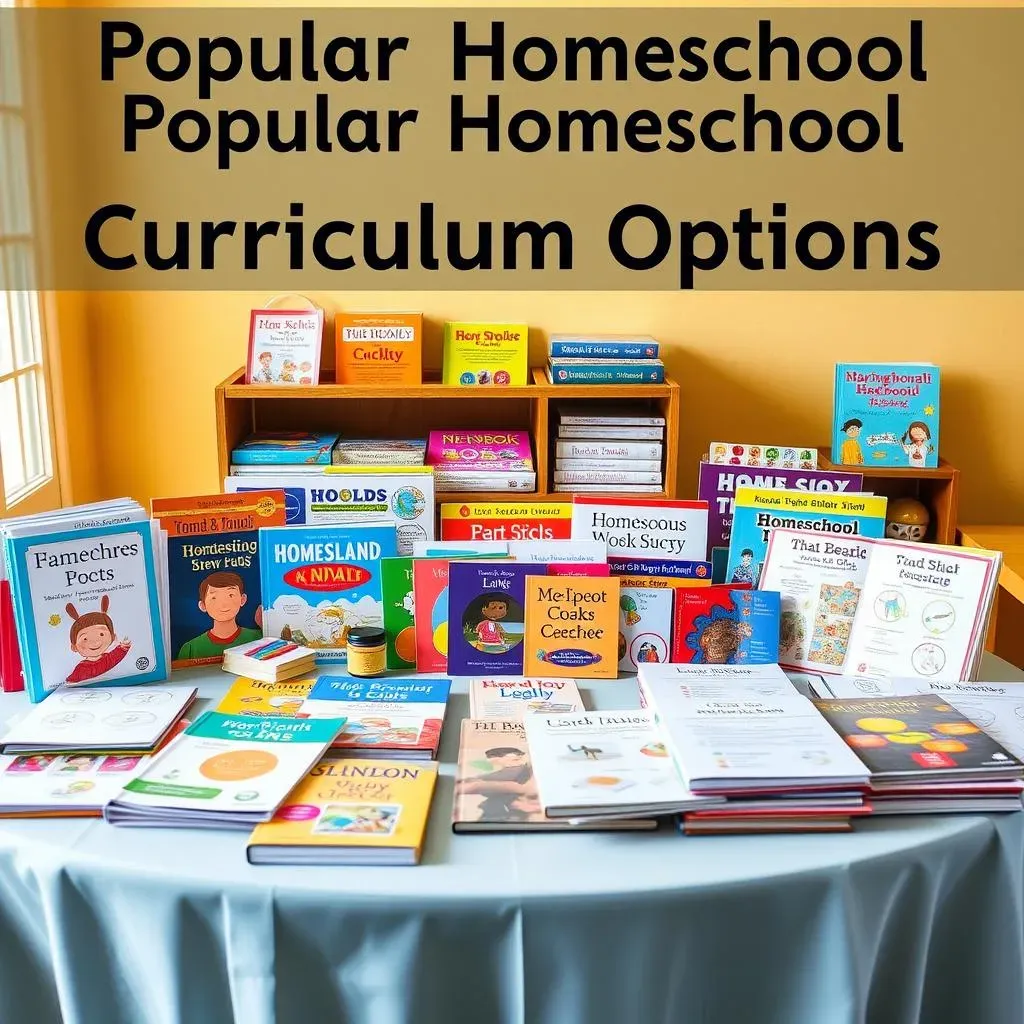Table of Contents
Are you tired of the same old textbooks? Do you crave a more engaging and flexible way to teach your kids at home? Then, let's talk about the magic of a homeschool unit study curriculum! It's like swapping a stuffy classroom for an exciting adventure, where learning revolves around a central theme, not just a list of subjects. Imagine diving deep into ancient Egypt, not just reading about it, but building pyramids, writing hieroglyphs, and even cooking Egyptian food. That's the power of a unit study! This article will be your guide, showing you the many forms unit studies can take, from quick dives into specific topics to full-year programs. We'll check out some of the most popular options out there, and more importantly, we'll discuss how to make this approach work for your unique family, your style, and your student's needs. Get ready to explore a world of learning that's anything but boring!
What is a Homeschool Unit Study Curriculum?
What is a Homeschool Unit Study Curriculum?
Okay, so you're checking out this whole "homeschool unit study curriculum" thing, right? Well, think of it like this: instead of learning subjects in separate boxes, like math here, history there, and science somewhere else, a unit study throws everything into one big, awesome pot. It's all about picking a topic—dinosaurs, the solar system, the roaring twenties—and then using that topic to explore all the different subjects. So, math might be counting dinosaur bones, history could be learning about the scientists who discovered them, and science might be how fossils are formed. It's like a super-powered, themed learning adventure, making connections between subjects that you never knew existed. It makes learning feel way more natural, and honestly, way more fun!
It's a different approach than just cracking open a textbook and doing the next chapter. With a unit study, learning becomes a journey, not a checklist. You're not just memorizing facts; you're actually engaging with the information, applying it in different ways, and seeing how everything fits together. It’s like building a puzzle, where each piece (subject) helps you see the bigger picture (the unit topic). Unit studies can be short, maybe just a few weeks, or they can last for an entire semester, depending on the depth you want to go. The best part? You can totally tweak them to fit your kids' interests and learning styles.
Think of it like planning a big party. Instead of just throwing random decorations and food together, you pick a theme – like a luau or a superhero bash – and everything from the invitations to the games revolves around that theme. A unit study is the same thing, but for learning. It's about making those connections and making learning stick!
Key Aspect | Traditional Curriculum | Unit Study Curriculum |
|---|---|---|
Subject Approach | Separate, often unrelated subjects | Integrated subjects around a theme |
Learning Style | Textbook-based, often passive | Hands-on, active, and engaging |
Flexibility | Rigid schedule, pre-set content | Adaptable, customizable to interests |
Exploring Different Types of Unit Studies
Exploring Different Types of Unit Studies
Themed Unit Studies
Alright, so we've established what a homeschool unit study curriculum is all about. Now, let's get into the fun part: the different flavors they come in! First off, you've got your classic themed unit studies. These are like the bread and butter of unit study world. You pick a topic, like "oceans," and then you explore everything related to it. This might include ocean animals in science, ocean currents in geography, famous explorers in history, and even sea shanties in music. It’s a deep dive into a particular subject that connects various aspects of learning.
These types of studies can be super flexible. You can keep it light and breezy, or you can really get into the nitty-gritty details. It all depends on what your kids are into and how much time you've got. Themed unit studies are great for sparking curiosity, because they let kids see how all the different subjects intertwine and relate to each other. It's not just about memorizing facts; it's about understanding the big picture.
Project-Based Unit Studies
Next up, we've got project-based unit studies. These are for those of you who love a good hands-on activity. Instead of just reading and writing about a topic, you're actually *doing* something with it. For example, instead of just studying about the middle ages, you might build a model castle, create a family crest, or even stage a mini-medieval play. The focus here is on creating something tangible, which helps reinforce what they are learning.
Project-based unit studies can be messy and take time, but they are incredibly engaging. Kids get to use their creativity and problem-solving skills, which makes learning feel more like play than work. You're not just learning *about* something, you're experiencing it. It’s learning by doing, which is awesome for kids who need to move and get involved.
Type of Unit Study | Focus | Learning Style | Examples |
|---|---|---|---|
Themed | Exploring a specific topic | Integrated, multi-subject | Ancient Civilizations, Space Exploration, Rainforests |
Project-Based | Creating a tangible product | Hands-on, experiential | Building a model solar system, writing a play, creating a cookbook |
Literature-Based Unit Studies
Lastly, let’s talk about literature-based unit studies. These are fantastic for bookworms! The central idea is to use a great book or series of books as the starting point for learning. So, let's say your family is reading "The Hobbit." You could explore maps and geography by tracing Bilbo's journey, study the history of fantasy literature, create your own elvish language, or even discuss the different character archetypes. The book becomes the springboard for all sorts of interesting explorations across different subjects.
Literature-based unit studies are excellent for fostering a love of reading and for showing how stories can connect to the real world. It's like stepping into the pages of a book and making it come to life. It's a wonderful way to make learning personal and memorable. Plus, who doesn't love a good story?
"The more that you read, the more things you will know. The more that you learn, the more places you'll go." - Dr. Seuss
Popular Homeschool Unit Study Curriculum Options
Popular Homeschool Unit Study Curriculum Options
Ready-Made Unit Studies
Okay, so you're sold on the idea of a homeschool unit study curriculum, but maybe the thought of planning one from scratch makes your head spin? No worries, there are tons of fantastic ready-made options out there! These are like your "plug-and-play" solutions – someone else has already done the hard work of putting together the resources, activities, and lesson plans. Think of it like a meal kit, but for learning. You get everything you need, and you just follow the instructions. This can be a huge time-saver, especially if you're new to homeschooling or if you're juggling a lot of other things.
One popular choice is "My Father's World," which blends a literature-based approach with lots of hands-on activities and a Christian worldview. Another well-loved option is "Gather 'Round Homeschool," which is designed for teaching multiple ages at once, all focused on one main topic. These programs often include detailed teacher guides, student workbooks, and all the necessary books and supplies, making it super easy to just jump right in and start learning. It's like having a personal homeschool assistant!
Curriculum with Unit Study Elements
Now, let's talk about programs that aren't strictly unit studies, but incorporate a unit study approach. These are often more comprehensive curriculums that use a thematic approach within their structure. For example, "Sonlight Curriculum" is known for its literature-rich approach, which often feels like a unit study because it focuses on specific time periods or geographical regions and interweaves history, literature, and geography. Another one is "Moving Beyond the Page" which offers a variety of unit studies that integrate different subject areas, with a focus on critical thinking and creativity. These programs provide more structure than a pure unit study, but still give you the benefits of a thematic approach.
The benefit of these types of programs is that you get the best of both worlds. You get the structure of a traditional curriculum, but also the engaging, integrated learning experience of a unit study. They're great for families who like a little guidance but still want the flexibility to adjust things to fit their needs. It's like having a roadmap, but with the freedom to take some scenic detours along the way!
Curriculum Type | Description | Key Features | Example |
|---|---|---|---|
Ready-Made Unit Studies | Complete, pre-planned units | All resources included, easy to implement | My Father's World, Gather 'Round Homeschool |
Curriculum with Unit Study Elements | Thematic approach within a structured curriculum | Combines structure with integrated learning | Sonlight Curriculum, Moving Beyond the Page |
Making Homeschool Unit Study Curriculum Work For You
Making Homeschool Unit Study Curriculum Work For You
Alright, so we've covered what a homeschool unit study curriculum is, the different types, and some popular options. Now for the real talk: how do you make it actually *work* for your family? It's not as simple as just picking a unit and jumping in. You need to think about what your kids are into, what your family's schedule looks like, and what your goals are for homeschooling. It's about creating a learning experience that's tailored to *you*, not just following a pre-set plan. This means you might need to tweak things, add your own activities, or even scrap an idea that's not working. Don't be afraid to experiment and see what clicks. The beauty of a unit study is its flexibility – it should fit your life, not the other way around.
First off, involve your kids in the process. Let them help choose the topics, brainstorm activities, and even design some of their own projects. This makes them feel like they have a say in their education, which can make them more excited and engaged. Think of it as a collaborative effort, not just you dictating what they need to learn. If your kid is obsessed with space, then maybe start with a solar system unit, or if they are all about animals, dive into a study of the rainforest. When they have a say in the topic, they are more invested in the process. Remember, the best curriculum is the one that your kids actually enjoy. It is not about perfection, it’s about progress.
Tip | Description |
|---|---|
Involve Your Kids | Let them help choose topics and activities. |
Be Flexible | Adjust the plan as needed. |
Focus on Interests | Pick topics that engage your kids. |
Next, don't feel like you need to cover every single aspect of a topic. It's okay to leave some things out, or to come back to them later. The goal is not to become experts on everything, but to spark curiosity and a love of learning. You could also consider using a mix of resources. Don't feel like you need to stick with just one book or one curriculum. Supplement with videos, documentaries, field trips, library books, or even online games. Variety is the spice of learning, and it will help keep things interesting and engaging. It's about creating a rich and varied learning environment, not just checking off boxes on a list.
Finally, remember to keep it fun! Learning should be an enjoyable experience, not a chore. If you're finding that a unit study has become stressful or tedious, it's time to take a step back and re-evaluate. Maybe you need to change the topic, or maybe you need to switch gears and try a different approach. The most important thing is that your kids are learning and growing, and that they are developing a lifelong love of learning. After all, that's what homeschooling is all about, right? Don’t be afraid to step away from the material if it’s becoming a burden, and remember that this is a journey, not a race.
"The best way to predict your future is to create it." - Abraham Lincoln